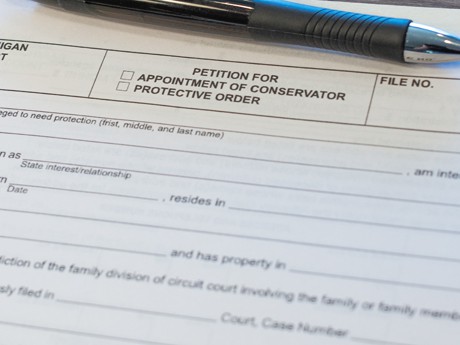Conservatorship Attorney in Michigan
Conservatorship involves the appointment of an individual to manage the financial decisions and other important decisions of another individual. This is a court supervised process that’s similar to the appointment of guardianship. If you or a loved one have legal issues involving this process, it’s important to speak with an estate planning and conservatorship attorney right away.
Michigan’s Process of Appointing Conservatorship
 A petition for appointment of a conservator may be brought by an individual who is requesting protection, a person who has an interest in that individual’s estate or welfare, or a person who has been adversely affected by ineffective management of the property or affairs of the person who is be protected by the petition. The court will appoint a conservator if it determines that a basis for the appointment has been established by clear and convincing evidence.
A petition for appointment of a conservator may be brought by an individual who is requesting protection, a person who has an interest in that individual’s estate or welfare, or a person who has been adversely affected by ineffective management of the property or affairs of the person who is be protected by the petition. The court will appoint a conservator if it determines that a basis for the appointment has been established by clear and convincing evidence.
A conservator has the power to inventory the estate and report to the court. The conservatorship ends when the person to be protected reaches majority or when the disability of the protected party is no longer applicable. A conservator may also resign as the conservator with the court’s permission.
In Michigan, an appointed conservator could be an individual, a corporation or a professional conservator. If there are more than one option, the court will pick the best qualified among the people willing to serve as the conservator. A professional conservator is entitled to a fee for their services.
For both adult and minor conservatorship prior to the appointment of a conservator the court may appoint a guardian ad litem to represent the individual, and conducts an investigation and reports their findings to the court with recommendations.
If the person is in need of a conservator due to a disability, the court will appoint the proper physician and/or mental health professional to examine and evaluate the individual, and decide if they need a conservatorship, what the alternatives might be, and and for how long it will be needed. In Michigan, any durable power of attorney remains in place even after the conservator has been appointed.
Adult Conservatorship
In Michigan, a conservatorship for an adult will be appointed if the petitioner can show that the adult is unable to manage their own property or business because of mental illness, mental deficiency, physical illness, chronic use of drugs or alcohol, confinement, detention by a power country, disappearance or disability . The petitioner must also show that the individual has property that will be wasted unless proper management is provided, or that money is needed for the support, care and welfare or for those entitled to the person’s support.
In Michigan, an individual of sound mental competence, but due to age or physical condition is unable to manage their affairs may ask a court to appoint a conservator.
If the conservatorship decision involves a child of at least 14 years of age, the child’s preference and input must be considered by the court.
Powers of a Conservator
Conservators in Michigan gave power to handle all assets held on behalf of the protected party, and to make payments from the assets for the health , benefit and welfare of the protected person. The conservator may act on their powers without the court’s permission unless states otherwise. Here is a list of some of the powers of a conservator – this is not meant to be exhaustive.
Conservators are required to file an annual accounting of all receipts and disbursements from a conservatorship 56 days after the accounting period.
In Michigan, when will a conservator be appointed for a minor child?
In Michigan, a petitioner must show that the minor child owns money or property that requires management or protection, has business affairs that may be jeopardized or prevented because of the child’s age or the child needs money for support and education and protection is necessary to obtain such resources.
Terminating a Conservatorship in Michigan
In Michigan, any person with an interest in the protected party, including the protected party may petition the court to terminate the conservatorship. A conservatorship of a minor child unless otherwise stated ends when that child turns 18, and for an adult, it will terminate when the adult reaches mental capacity or they die.
When a conservatorship ends, the conservator must return all assets to the control of the individual. If the protected party dies, the conservator will deliver any will, inform all necessary parties of the death, and retain the estate for delivery to the person’s representative. It’s possible for the conservator to become the personal representative if no one else is identified and the conservator wishes to be the representative.




